Diversity Day Events 2017

Diversity Day 23 November, 2017
This event focused on cultural diversity at university. It started by three students sharing some of their intercultural experience. Anna Kruppai, Zsófia Baranyai and Tímea Mihály told the audience stories that all pointed to the importance of learning about practices and values of other cultures, of being open and curious, and of initiating contact between people of different cultures. The next activity was led by Dorottya Holló. The audience worked in small groups and shared positive and negative experience they had connected to diversity (mostly) at university. Then they identified things that they have learnt due to living, studying and teaching in a diverse context and things that they - and we all - still have to learn.
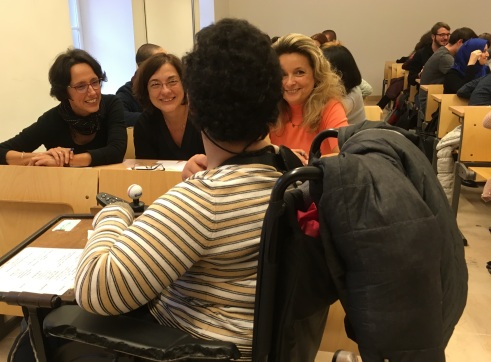
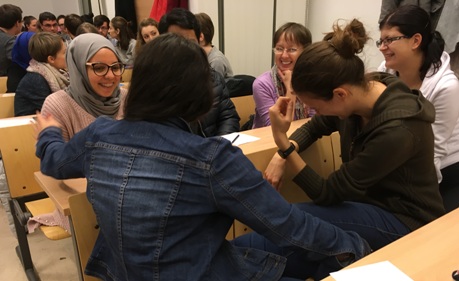
The slips of paper where these were written down were collected and a few ideas are listed here. Please note that the ideas have been summarized as many of them were quite similar.
Positive experience of diversity:
People are open and approachable; new languagues and ideas can be learnt; learning about different cultures; people connect easily, are curious, accepting and understanding; collaboration between students of different cultures in classes; experiencing different approaches and attitudes from one's own; making friends; ESN - Erasmus Student Network; useful to experience working with people with disabilities in class; enjoying diversity; learning about other people's perspectives and mindsets;
Negative experience of diversity:
Different students have very different approaches to and practices of studying, responsibility, arriving on time, plagiarising, class discussions, eye contact, nose blowing, personal space, assertiveness, and so on, and this can be strange, uncomfortable or sometimes irritating; some other comments: people are not open; difficulty of understanding some accents; some people suffer from being shy and nervous communicators; someone wrote about an African student who was attacked;
Things we have learnt from experiencing diversity at university:
accepting and embracing difference; not to be afraid of the unknown; being open, tolerant and accepting; being careful with our words; What is obvious to me may not be obvious to someone else; different ways of respecting others; treating others as we want to be treated; It is easy to build bridges btw people; balancing between the truth value and the misconceptions of stereotypes; It is better to ask questions than to assume things; people have different priorities; patience; empathy; not being judgmental; the importance of learning to learn and of always wanting to learn; questioning our own values and practices; thinking "outside the box";
Things we still have to learn to enhance our experience of diversity:
to be nonjudgmental; how to get rid of stereotypes; how to approach people; how to let go of some of our ideas; how to find common ground with others; not to judge on the basis of first impressions; to be more aware of different needs; to make information more easily accessible to international students (in English); to be more optimistic; to socialise more; to be more patient, how to deal with not understanding certain accents; how to motivate students to do what they are not accustomed to do;
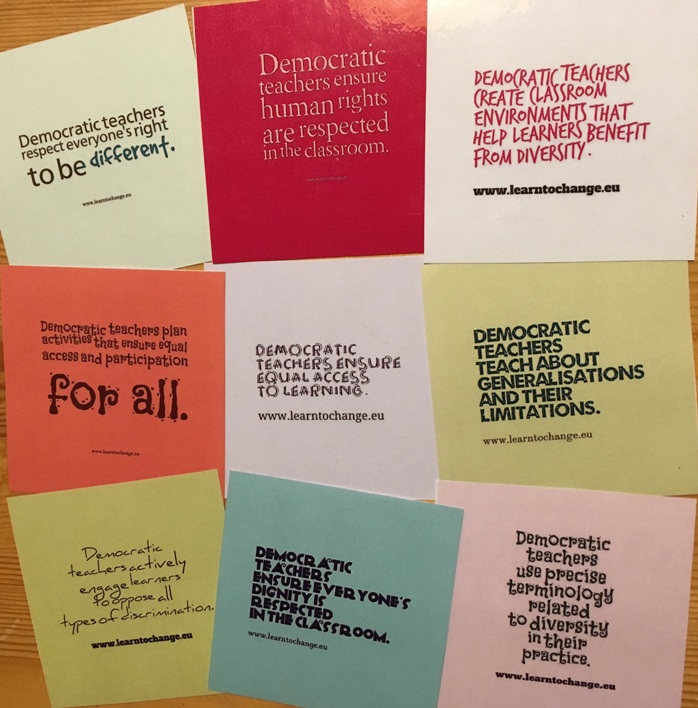
The last activity of this Diversity Day Event was "Speed Dating" conducted by Ildikó Lázár. The participants were paired up and were given cards containing statements about how teachers can create a democratic learning environment to promote the development and growth of intercultural competences, i.e., attitudes, knowledge and skills that allow to have responsible, reflective, open, inclusive and positive relationships with others around us. The partners and the cards shifted after a few minutes, so we all had the opportunity to talk about a number of issues to various people. The topics discussed are not only valid for classroom contexts!
Diversity Day 28 March, 2017
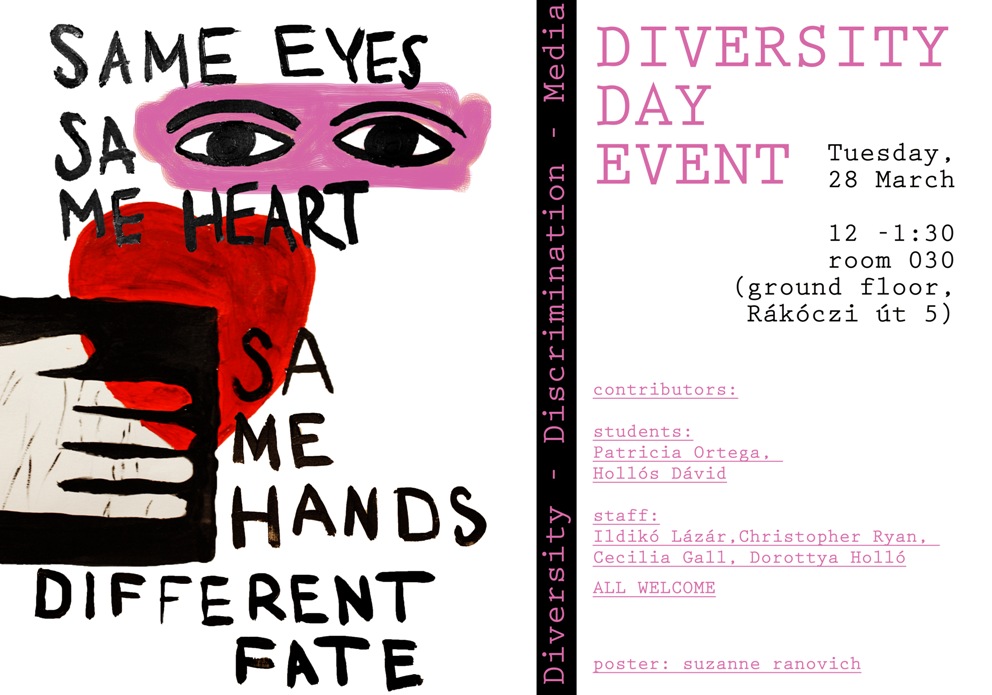 The event focused on diversity - discrimination - media. As the opening of the programme, Ildikó Lázár showed pictures of diverse fauna and flora, landscapes and forms of our built environment, and mentioned the diversity of languages which we are all fascinated by. Why is it then that human diversity is not always appreciated and often leads to animosity and clashes?
The event focused on diversity - discrimination - media. As the opening of the programme, Ildikó Lázár showed pictures of diverse fauna and flora, landscapes and forms of our built environment, and mentioned the diversity of languages which we are all fascinated by. Why is it then that human diversity is not always appreciated and often leads to animosity and clashes?
In the hope of giving a brief overview of both discrimination and appreciation on the basis of cultural, gender, social and ethnic differences, we looked at how these issues appear in the media and public discourse. Having watched a commercial shown by Dorottya Holló for a Danish television channel pointing out things that connect people despite their differences, the members of the audience tried to find unexpected similarities between them.
The next video, The DNA Journey, was a short summary of a project demonstrating that despite our national identities and stereotypical value judgements, our DNA shows that we have our roots in diverse cultures. As one of the participants of the project says: "This (i.e., a DNA analysis) should be compulsory. There would be no such thing as extremism in the world if people knew their heritage... Who would be stupid enough to think of such thing as a pure race?" The motto of the clip is: "An open world begins with an open mind."
Christopher Ryan then showed a short video made by Chinese students at Columbia University. They explain what their names mean and we find out that as opposed to European name giving customs, the Chinese give their children individual names that often express hopes and aspirations. The video clip was made in protest to xenophobia at the university.
In the following part of the event Dávid Hollós reported on a campaign by Muslim Americans to repair a vandalised Jewish cemetery. This fund raising campaign and cooperation between two groups that stereotypically display ill feelings towards one another is an eloquent example for reconciliation and ways to fight hatred and violence.
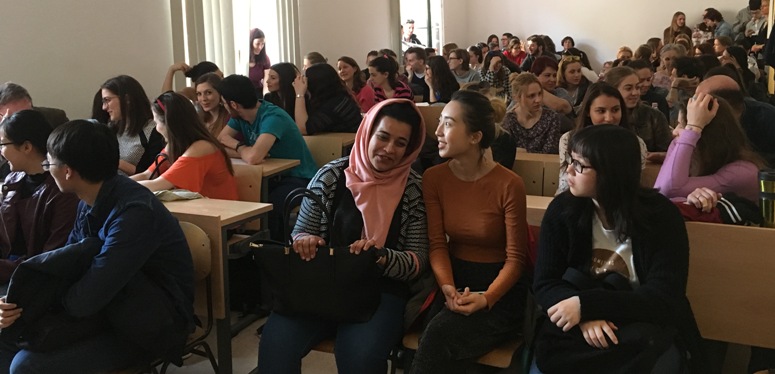
Patricia Ortega showed her own slides when she talked about extreme forms of discrimination and ill-treatment of women. In her talk entitled "Lethal Gender Bias - The fight for women's rights around teh world is far from over", she talked about honour killings, unhygenic sterilisation of women, sex selective abortion and human trafficking forcing women into prostitution or slavery. These are not just acts of discrimination but crime, and are practiced mostly in Muslim cultures, China and India. The weight of the topic had a dramatic effect on the audience.
Women are still not regaded as equals in the west either. Cecilia Gall's sent us clips that threw light on a number of aspects of discrimination. The first one reported on a sexist tirade against women by Polish MEP Janusz Korwin-Mikke in the European Parliament. The MEP was fined for airing his opinions, but discriminating views still persist widely and sometimes in hidden ways. This is the case in how women are represented in literature, and even children's literature as illustrated in "The Ugly Truth about Children's Books". Finally we listened to Annie Lennox encouraging men to be feminists in an interview.
Advertisements are very powerful in shaping the way people think. Dorottya Holló called attention to a few examples. The Audi advertisement at the Superbowl in 2017 tackled the issue of equal opportunities and equal pay for women as a commitment to progress. The Coca Cola advertisement screened at the same event highlights the multiculturality of the USA. As a summary of the celebration of diversity, a video of the "Love has no labels" movement against bias was shown. The last picture at the event was that of "short haired twins". The story that was shared by the mother of a four-year-old proves that bias and discrimination are not part of human nature but are learnt through socialisation. If only this learning never took place! - In her closing words Ildikó Lázár gave the audience some home work and encouraged everyone to speak up when they see injustice and discrimination and take every opportunity to talk about the values of diversity as this may be a tool for promoting acceptance in our world.

